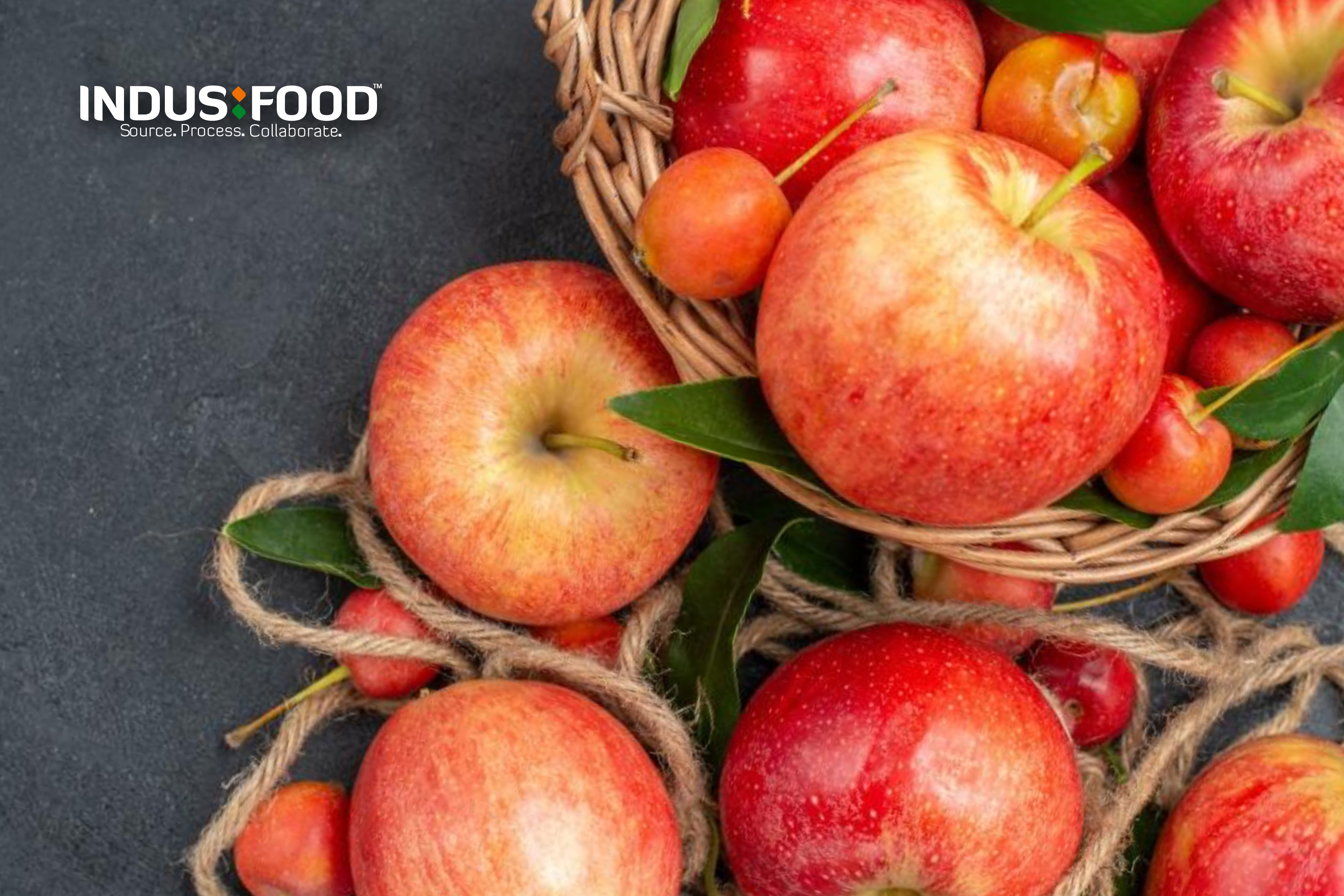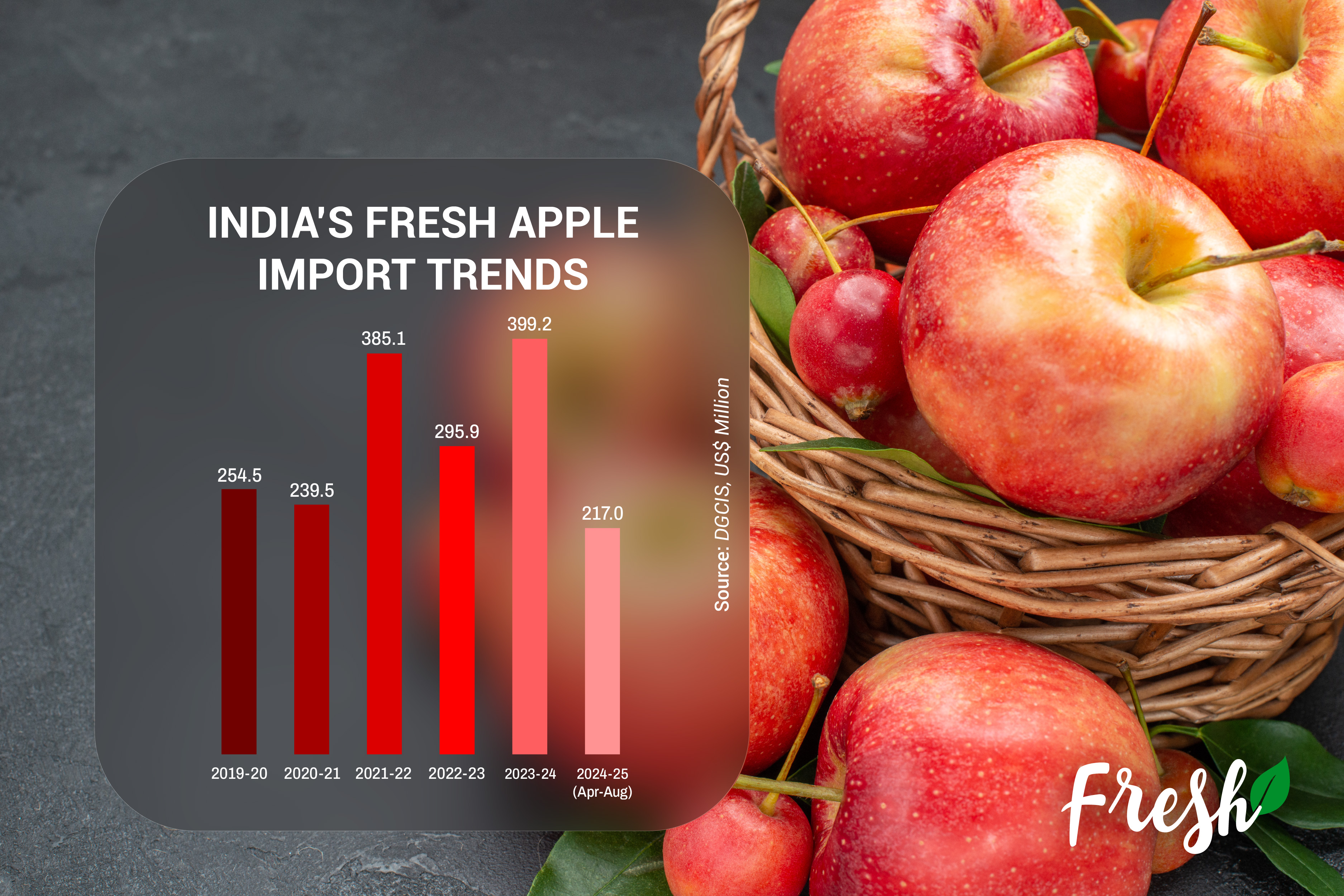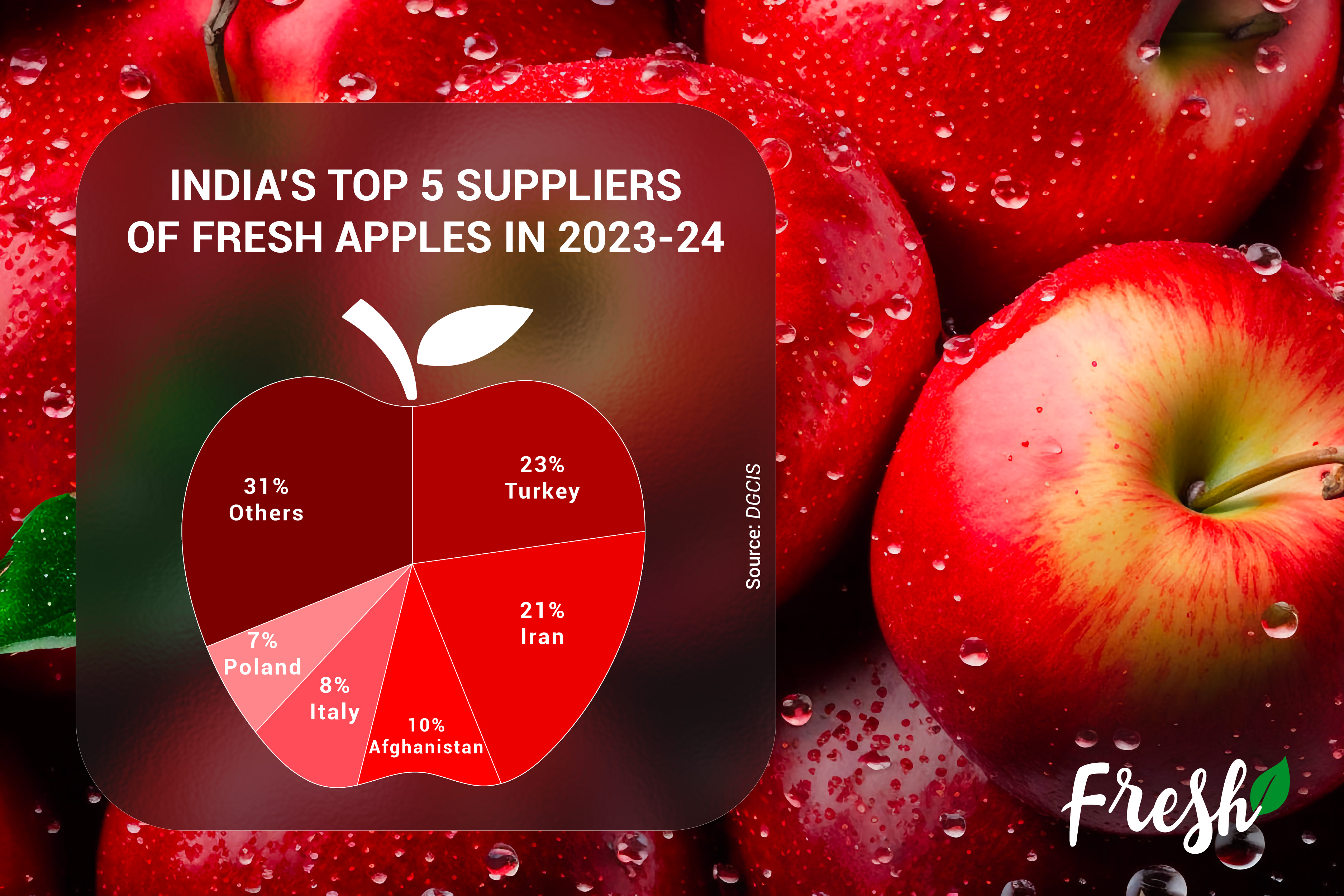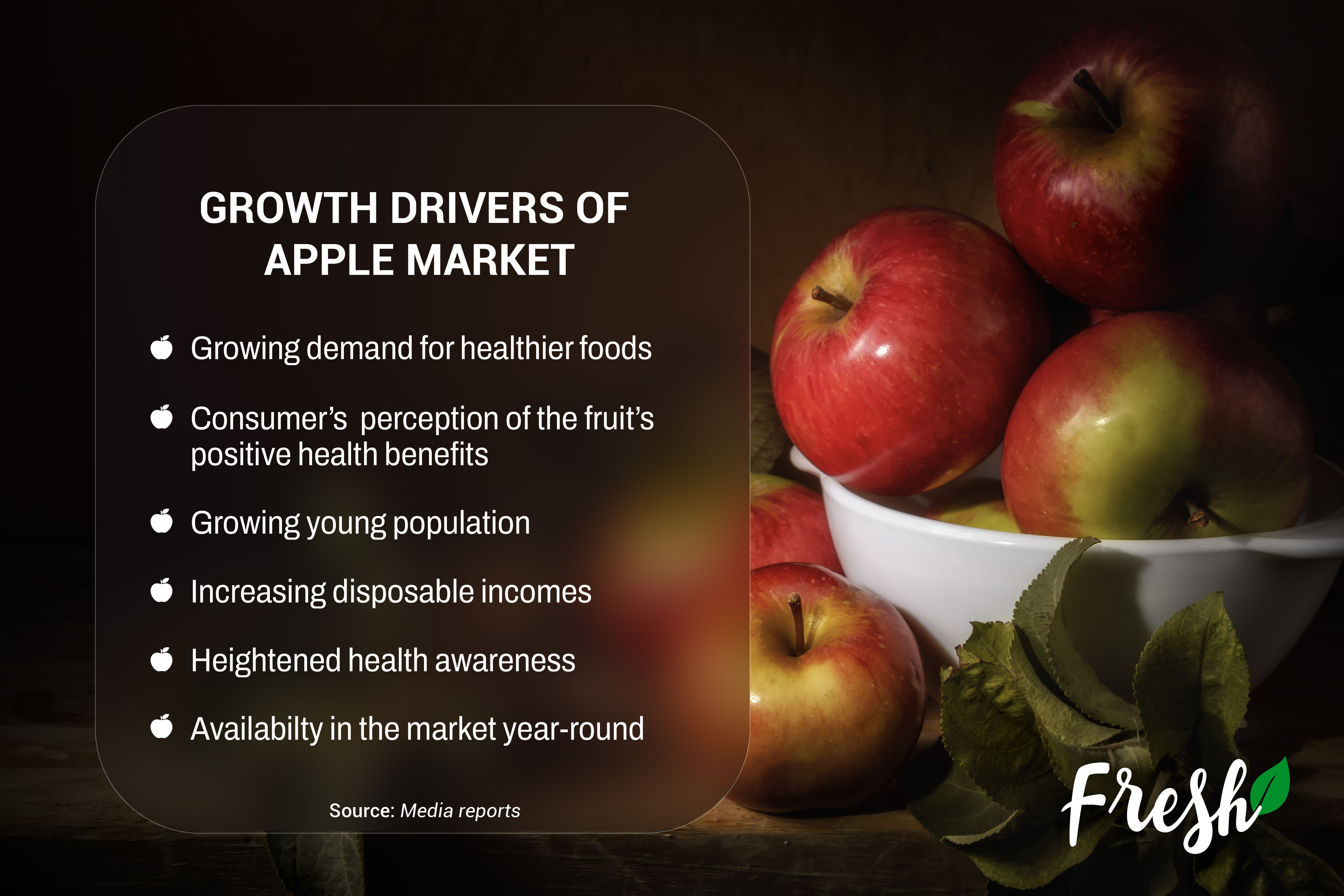
India’s apple market is currently experiencing significant growth, driven by an increase in health consciousness among consumers and a rising demand for nutritious food options. Apples are widely recognized for their dietary fiber, antioxidants, and essential vitamins, making them a preferred choice for those seeking low-calorie foods. The market potential is substantial, with India’s apple import value reaching US$ 399.59 million in the fiscal year 2023-24, up by 35% YoY.
Consumption patterns within India show that approximately 60% of apples are consumed fresh, while 40% are processed into various products like juices, jams, and cider vinegar.
An increasing preference for imported apples has positioned India as the world’s third largest importer of fresh apples. A wide variety of apples is available through imports, including popular types like Red Delicious and Fuji. Future prospects appear bright as the combination of health awareness, demographic trends, and investment initiatives continue to shape the industry.
Apples, cultivated globally, are a nutritious fruit packed with fiber, Vitamin C, and antioxidants, while being low in calories and fat, making them ideal for weight management and overall health. Their growing popularity has fueled significant expansion in the fresh apple market, especially in India.
The apple market in India is undergoing a delightful transformation, fueled by a surge in demand and an invigorating lifestyle shift towards health and wellness. With fresh, crunchy apples considered as the go-to snack for health-conscious consumers, the country is embracing this nutritious fruit like never before.
In India, about 60% of apples are eaten fresh, while 40% are processed into products like sauces, jams and jellies, dried apples, canned slices, apple cider vinegar, apple wine, apple pomace, and juices for domestic use. The demand for these apple-based products is steadily increasing in India.
This trend is fueled by heightened health consciousness and rising disposable incomes. Additionally, the growing preference for convenience foods complements the shelf-stable qualities of processed apple products.
Apple juice and concentrate are among the most popular and widely consumed value-added products derived from apples. India’s Apple Juice Concentrate market is the fastest-growing market in the Asia-Pacific region. Dried apple products like apple chips, apple rings, and apple powder are becoming increasingly popular because of their extended shelf life, convenience, and intense flavor.
These can be enjoyed as snacks, used as toppings, or ingredients in a variety of culinary applications. In Asia-Pacific, India ranks among the leaders in the Dried Apple Market. The demand for apple cider vinegar in India is expected to grow at a CAGR of 6.2% through 2034.
In India, apples are mainly grown in Jammu & Kashmir, Himachal Pradesh, and the hilly regions of Uttar Pradesh and Uttarakhand. They are also cultivated on a smaller scale in Arunachal Pradesh, Nagaland, Punjab, and Sikkim.
The popular varieties of apple in the country are:
According to FAS New Delhi, for India’s market year (MY) 2023/2024 (July-June), apple consumption was estimated at 2.63 million metric tons (MMT). Correspondingly, apple production during the period is estimated at 2.41 million metric tons (MMT).
While domestic production is expected to see a modest increase, the demand for premium imported apples continues to grow. Moreover, Indians’ taste for fresh apples has grown further since the pandemic, resulting in a notable surge in apple imports.
India is emerging as a key market for apples as demand for premium imported apples is rising. In 2023-24, India imported fresh apples worth US$ 399.6 million, up by 35% YoY.

Turkey was the major supplier to India of fresh apples worth US$ 90.09 million in 2023-24. Other major suppliers of fresh apples to India are Iran (US$ 82.15 million), Afghanistan (US$ 40.58 million), Italy (US$ 31.35 million) and Poland (US$ 26.33 million).

Some of the most popular import varieties of apples arriving in India include- Red Delicious, Fuji, Gala, Royal Gala, Granny Smith, and Honeygold. Besides these, India also imports other varieties including Qinguan, Huaniu, Cripps Pink, Pacific Rose, Evelina, Queen, Red Star, and Golden Delicious.
In India, apples are widely regarded as healthier than other fruits. Major growth drivers for the apple market are:
Year-round availability: Fresh apples are readily available throughout the year, catering to continuous demand.

Foreign apple growers are keenly looking at India’s market potential and leveraging every opportunity to capitalize on this momentum. The increasing health consciousness, persistent demand for processed apple products, and a robust supply chain with diversified import sources solidify India’s role as a crucial player in the global apple market.
According to Shashin Patel, Chief of Operations at RHU organics, “India’s demand for apples is growing fast. People are becoming more interested in organic and chemical-free apples, especially after COVID-19, as they want healthier, natural fruits. Along with taste, customers are now focused on quality and where the apples are coming from.”
This year a Spanish bio-innovation leader Kimitec has formed a strategic partnership with FIL Industries, a key player in India’s apple sector based in Kashmir, to transform the country’s apple industry. Both companies estimate that this collaboration could tap into a market valued at approximately US$30 million over the next five years. Another Kashmir based firm Qul Fruitwall Farm Installations, has become the first private company to have a foreign private equity investment of Rs 60 crore.
The apple craze in India encapsulates a broader lifestyle shift towards health and wellness, offering immense opportunities for stakeholders across the supply chain. As the market continues to grow, it will undoubtedly shape consumer preferences and the nutritional landscape in the country for years to come.
Read More:
As India’s largest food trade show, Indusfood offers vital support to the apple industry by bringing together global growers, exporters, and supply chain leaders at a premier platform. This food exhibition enables stakeholders to connect, explore strategic partnerships, and tap into the growing demand for high-quality apples in India, including organic and chemical-free options. Indusfood’s comprehensive marketplace facilitates collaborations, like those with bio-innovation firms, boosting India’s apple supply chain and driving innovation in quality and sourcing. Through this Indian Food exhibition, the apple sector gains visibility and access to consumer insights that shape future growth.
© Trade Promotion Council of India. All Rights Reserved.